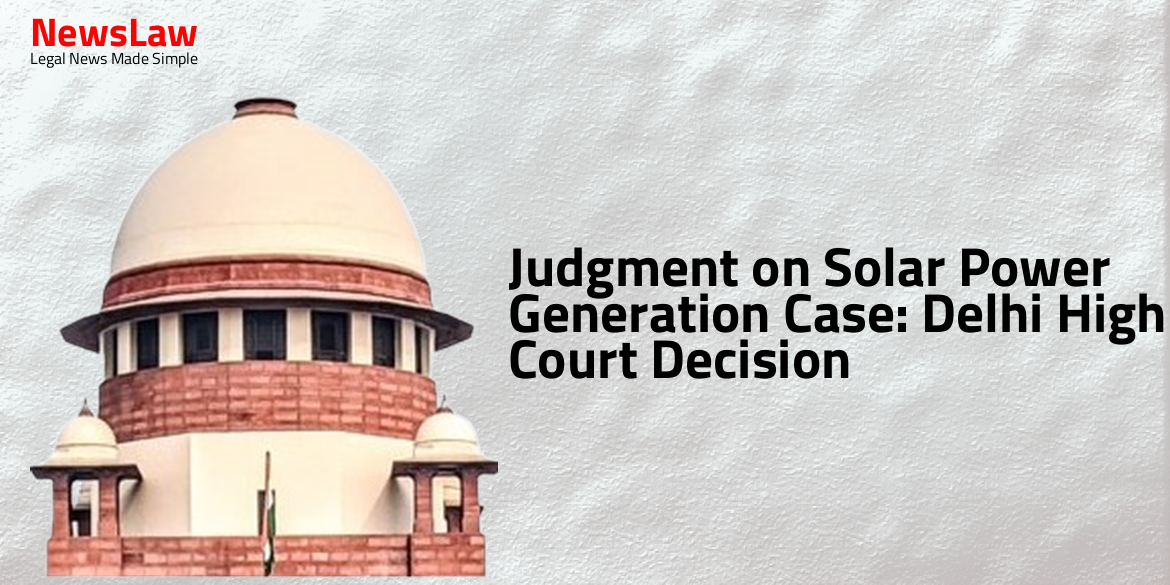In a recent legal case before the High Court of Calcutta, the judgment was delivered in the matter of English Bazar Municipality versus their neighbors. The court’s ruling sheds light on the intricacies of the dispute and sets a precedent for similar cases in the future. Let’s delve into the details of this important legal decision and its implications for all parties involved.
Facts
- The High Court of Calcutta observed that the appellant did not challenge the reasoning of the learned Single Judge that the writ petition was not maintainable.
- The appellant primarily contended that the Division Bench erred in holding that the appellant did not have a locus standi to challenge the acquisition of the land.
- The High Court stated that the issue of maintainability based on locus standi was correctly decided by the Division Bench.
- The Division Bench noted that the appellant did not establish any legal right of their own in the acquired land and therefore lacked standing to challenge the acquisition.
- The High Court dismissed the appeal on the grounds of lack of maintainability and upheld the order of the Division Bench.
- The appellant’s arguments regarding the interpretation of Section 4(1) of the Land Acquisition Act were found to be without merit.
- Mr. Krishnendu Narayan Choudhury, Chairman, English Bazar Municipality was personally present in Court.
- Time was requested by the learned senior advocate representing the alleged contemnor to comply with the Court’s direction.
- The matter was adjourned until 30 November 2023.
- The Court’s order was to be complied with, and a fresh affidavit of compliance was to be filed on the adjourned date.
Arguments
- The writ petition filed by the private respondent alleged non-maintenance of open spaces prescribed under Rule 50 of the Rules of 2007 by the appellants during construction.
- The appellants argue that the municipal authorities may be prejudiced by the contempt proceedings, impacting their ability to contest the notice fairly.
- The appellants also argue that the directions issued by the Single Judge in the contempt petition directly affect their residential premises.
- The senior counsel for the appellants contends that the Single Judge erred in entertaining a writ petition involving a private dispute between neighbors.
- The municipal authorities issued a show cause notice to the appellants, claiming their building was in contravention of Rule 50 of the Rules of 2007, but the appellants argue no violation of the sanctioned building plan occurred.
- The appellants fear an adverse order for demolition under pressure of the contempt proceedings and seek the liberty to challenge the enquiry report and show cause notice through provisions of the West Bengal Municipal Act, 1993.
- Learned counsel for the respondent vehemently opposed the submissions made by the appellants’ counsel.
- The learned Single Judge concluded after thorough examination of the records that the appellants had violated the sanctioned building plan during construction of their residential premises.
- The direction for conducting an enquiry into the matter was deemed justified based on the findings.
- The court carefully considered all submissions and reviewed the materials on record.
Also Read: Anwarkhan vs. State of Gujarat: NDPS Act Compliance Case
Analysis
- The appellants are permitted to challenge the show cause notice dated 24 April, 2024, and the enquiry report(s) according to the provisions of the West Bengal Municipal Act, 1993.
- The judgement questions the exercise of writ jurisdiction by the Single Judge of the High Court of Calcutta in a seemingly private dispute between the appellants and their immediate neighbor.
- If the neighbor was aggrieved by irregularities in the appellants’ construction on their own plot, the appropriate remedy would have been to approach municipal authorities or civil court.
- The enquiry report has been submitted to the High Court of Calcutta by the municipal authorities.
- The appellants have the right to challenge the enquiry report and the show cause notice objectively.
- The objections raised by the appellants will be considered without influence from the pending contempt proceedings or writ orders.
- According to the enquiry report dated 16 October 2023, the construction by the appellants is not in violation of the building plan and the sanction plan for the building construction exists.
Also Read: A Case of Culpable Homicide: The Appeal of Kariman vs. State of Chhattisgarh
Decision
- As per sub-clause(3) of Section 218 of West Bengal Municipal Act, 1993, appellants have the right to file an appeal in court if objections are not accepted by the Board of Councillors.
- The appeal in this case has been disposed of with no order as to costs.
- Any pending applications are also disposed of.
Case Title: RANBEER BOSE Vs. ANITA DAS (2024 INSC 379)
Case Number: C.A. No.-005941-005941 – 2024



